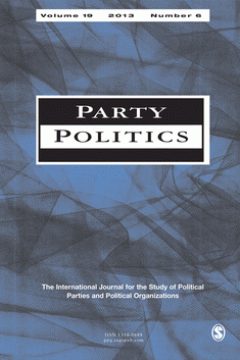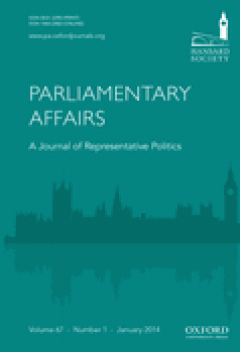Filter by

When does valence matter? Heightened valence effects for governing parties du…
Empirical election studies conclude that party elites' images with respect to competence, integrity and party unity – attributes that we label character-based valence – affect their electoral support (Stone and Simas, 2010). We compile observations of media reports pertaining to governing party elites' character-based valence attributes, and we relate the content of these reports to mass suppor…
- Edition
- Volume 19, Nomor 1, 2013, p. 61-82
- ISBN/ISSN
- 1354-0688
- Collation
- -
- Series Title
- Party Politics
- Call Number
- -

Parties heed (with caution): Public knowledge of and attitudes towards party …
Despite comprehensive reform (Political Parties, Elections and Referendums Act) and recent review (Phillips Review in 2007) of party finance in Britain, public opinion of party finance remains plagued by perceptions of corruption, undue influence from wealthy donors, carefree and wasteful spending and, more generally, from the perception that there is just ‘too much money’ in politics. In this …
- Edition
- Volume 19, Nomor 1, 2013, p. 41-60
- ISBN/ISSN
- 1354-0688
- Collation
- -
- Series Title
- Party Politics
- Call Number
- -

A tale of two e-parties: Candidate websites in the 2008 US presidential prima…
The Internet has become a relevant campaign tool in the United States and the 2008 presidential elections have marked a turning point in the recognition of its potential. This study analyzed candidate websites during the 2008 presidential primaries through a quantitative coding frame supplemented by latent trait analysis and meta-analysis of coding frames employed by seven earlier studies. The …
- Edition
- Volume 19, Nomor 1, 2013, p. 19-40
- ISBN/ISSN
- 1354-0688
- Collation
- -
- Series Title
- Party Politics
- Call Number
- -

The adoption of direct primaries in the United States
This article asks why, and when, the process of nominating candidates in the United States changed from conventions to direct primaries. We conduct an event history analysis to investigate rival explanations for why the rules governing nominations changed. One credits reformist pressures that were largely external to the interests of the major political parties. Another proposes that party elit…
- Edition
- Volume 19, Nomor 1, 2013, p. 3-18
- ISBN/ISSN
- 1354-0688
- Collation
- -
- Series Title
- Party Politics
- Call Number
- -

Party Politics, Volume 19 Nomor 6 November 2013
- Edition
- -
- ISBN/ISSN
- 1354-0688
- Collation
- -
- Series Title
- -
- Call Number
- -
- Edition
- -
- ISBN/ISSN
- 1354-0688
- Collation
- -
- Series Title
- -
- Call Number
- -

Party Politics, Volume 19 Nomor 5 September 2013
- Edition
- -
- ISBN/ISSN
- 1354-0688
- Collation
- -
- Series Title
- -
- Call Number
- -
- Edition
- -
- ISBN/ISSN
- 1354-0688
- Collation
- -
- Series Title
- -
- Call Number
- -

Party Politics, Volume 19 Nomor 4 July 2013
- Edition
- -
- ISBN/ISSN
- 1354-0688
- Collation
- -
- Series Title
- -
- Call Number
- -
- Edition
- -
- ISBN/ISSN
- 1354-0688
- Collation
- -
- Series Title
- -
- Call Number
- -

Party Politics, Volume 19 Nomor 3 May 2013
- Edition
- -
- ISBN/ISSN
- 1354-0688
- Collation
- -
- Series Title
- -
- Call Number
- -
- Edition
- -
- ISBN/ISSN
- 1354-0688
- Collation
- -
- Series Title
- -
- Call Number
- -

Party Politics, Volume 19 Nomor 2 March 2013
- Edition
- -
- ISBN/ISSN
- 1354-0688
- Collation
- -
- Series Title
- -
- Call Number
- -
- Edition
- -
- ISBN/ISSN
- 1354-0688
- Collation
- -
- Series Title
- -
- Call Number
- -

Party Politics, Volume 19 Nomor 1 January 2013
- Edition
- -
- ISBN/ISSN
- 1354-0688
- Collation
- -
- Series Title
- -
- Call Number
- -
- Edition
- -
- ISBN/ISSN
- 1354-0688
- Collation
- -
- Series Title
- -
- Call Number
- -

Introduction: Are British Ethnic Minorities Politically Under-represented?
Obama's 2008 presidential victory in the USA triggered a debate in Europe and the UK as to whether someone from an ethnic minority could achieve similar success in national politics. The 2010 General Election saw a small increase in ethnic minority candidates, but a near doubling of the number of black and Asian members of parliament (MPs) in the House of Commons. During 2010 and 2011, the Univ…
- Edition
- Volume 66 Issue 2 April 2013, p. 235-245
- ISBN/ISSN
- 0031-2290
- Collation
- -
- Series Title
- Parliamentary Affairs
- Call Number
- -

The Expatriate Vote in the French Presidential and Legislative Elections of 2…
In the 2012 legislative elections, 11 new deputies were elected representing newly created constituencies for the French expatriate community. The Right-wing Union pour un Mouvement Populaire (UMP) that initiated this legislation expected to create a clutch of safe seats for its own party, because expatriate voters have, since extra-territorial voting was introduced in 1981, always given massiv…
- Edition
- Volume 66 Issue 1 January 2013 , p. 213-233
- ISBN/ISSN
- 0031-2290
- Collation
- -
- Series Title
- Parliamentary Affairs
- Call Number
- -

Towards Parity Democracy? Gender in the 2012 French Legislative Elections
The victory of the Left in 2012, and the application of reinforced parity legislation, led to significant gains for women in French politics, with 27% women in parliament and 50% in government, including a powerful Women's Minister. However, a poor performance by the Right, and the concentration of women in less powerful positions, indicate that the battle for equality is not yet won. Ségolène …
- Edition
- Volume 66 Issue 1 January 2013 , p. 197-212
- ISBN/ISSN
- 0031-2290
- Collation
- -
- Series Title
- Parliamentary Affairs
- Call Number
- -

Marine Le Pen and the ‘New’ FN: A Change of Style or of Substance?
The electoral challenge of the far right is an enduringly problematic feature of contemporary French politics. In the first rounds of the 2012 presidential and parliamentary elections, the Front National (FN) under new leader Marine Le Pen attracted a combined total of ten million votes, bringing its ultra-nationalist policies to the centre of national political debate. This article examines th…
- Edition
- Volume 66 Issue 1 January 2013 , p. 179-196
- ISBN/ISSN
- 0031-2290
- Collation
- -
- Series Title
- Parliamentary Affairs
- Call Number
- -

From Jean-Marie to Marine Le Pen: Electoral Change on the Far Right
In the first round of the 2012 French presidential election, Marine Le Pen drew a record score of 17.9% of the valid votes. Her success was attributed to the ‘de-demonization’ strategy she implemented to soften the party’s image, make it credible on other issues than immigration, and diversify its electoral audience. Survey data from 1988 to 2012 show a more complex picture. Marine Le Pen’s sup…
- Edition
- Volume 66 Issue 1 January 2013 , p.160-178
- ISBN/ISSN
- 0031-2290
- Collation
- -
- Series Title
- Parliamentary Affairs
- Call Number
- -

The Box Trumps the Net? Mediatising the 2012 Presidential Campaign
This article analyses and evaluates the role of the media in the 2012 presidential election. In particular, it focuses on campaign coverage by television and the internet from the perspective of both the main candidates' usage of the media (candidate communication) and the media's coverage of the campaign (political reportage and commentary). It argues that television, the dominant medium in th…
- Edition
- Volume 66 Issue 1 January 2013 ,p. 142-159
- ISBN/ISSN
- 0031-2290
- Collation
- -
- Series Title
- Parliamentary Affairs
- Call Number
- -

Everywhere and Nowhere: Europe and the World in the French 2012 Elections
European and global affairs are typically downplayed at election time in France, as elsewhere, and a rudimentary observation of the French 2012 presidential elections would appear to confirm this hypothesis. However, this article argues that in the case of the 2012 French elections the issues of ‘Europe’ and ‘the world’ were significant and inextricably linked to many of the ostensibly domestic…
- Edition
- Volume 66 Issue 1 January 2013 ,p. 124-141
- ISBN/ISSN
- 0031-2290
- Collation
- -
- Series Title
- Parliamentary Affairs
- Call Number
- -

Le Changement? French Socialism, the 2012 Presidential Election and the Polit…
This article analyses Hollande's presidential election campaign and victory of 2012, placing them in the historical, organisational and ideological context of French Socialism and the French party system. It argues that an effective campaign, an unpopular adversary and a French party system context unusually conducive to pooling the Left's electoral resources akin to 1981 all aided Hollande's c…
- Edition
- Volume 66 Issue 1 January 2013 p.106-123
- ISBN/ISSN
- 0031-2290
- Collation
- -
- Series Title
- Parliamentary Affairs
- Call Number
- -

Values and the Votes from Mitterrand to Hollande: The Rise of the Two-axis Po…
Like other European democracies, France appears to be moving towards a ‘new politics’. Cultural issues such as immigration and multiculturalism are now said to be more influential on voting behaviour than socioeconomic issues. In this paper we question the impact of values on the French presidential elections since 1988 and show that: (1) both new and old politics are playing a role; (2) this t…
- Edition
- Volume 66 Issue 1 January 2013 p. 69-86
- ISBN/ISSN
- 0031-2290
- Collation
- -
- Series Title
- Parliamentary Affairs
- Call Number
- -

Redistribution, Tax Policy and the Vote: The 2012 French Presidential Election
As tax policy is one of the most prominent issues for France at a time of great economic crisis and public debt, this article analyses how redistribution has been viewed and considered by voters. Assuming three main hypotheses about attitudes towards redistribution (egotropic perspective, sociotropic perspective and voter incompetence), we propose a series of empirical tests of these various ex…
- Edition
- Volume 66 Issue 1 January 2013 p. 87-105
- ISBN/ISSN
- 0031-2290
- Collation
- -
- Series Title
- Parliamentary Affairs
- Call Number
- -
 Computer Science, Information & General Works
Computer Science, Information & General Works  Philosophy & Psychology
Philosophy & Psychology  Religion
Religion  Social Sciences
Social Sciences  Language
Language  Pure Science
Pure Science  Applied Sciences
Applied Sciences  Art & Recreation
Art & Recreation  Literature
Literature  History & Geography
History & Geography